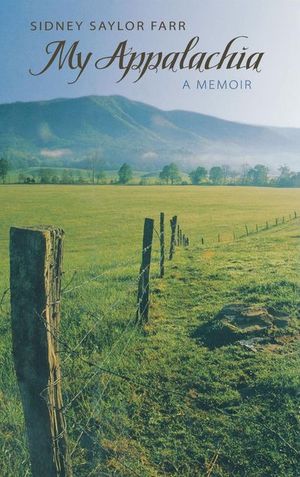My Appalachia
Published by The University Press of Kentucky
This remarkable memoir is “both one person’s extraordinary life story and a first-hand look at life in the mountains in a time that is fading from memory” (Kentucky Monthly).
My family lived as far back in the hollers as it was possible to go in Bell County, Kentucky. Dad worked in the timber woods and at a sawmill, when there was employment to be found. We ate what we grew on the place or could glean from the hillsides. Just about everything was made by hand. We had little contact with people outside the region . . .
Sidney Saylor Farr grew up in the mountains of southeastern Kentucky, the eldest of ten children. Her devotion to her family led her to accept heavy responsibilities from a very young age: At three, she remembers being put in charge of her baby sister while her parents worked in the corn field, and at twelve, she was forced to leave school to care for her ailing mother and younger siblings. Though she didn’t have much time to pursue her own goals, life in the mountains nourished and shaped Farr and the writer she would become.
Her great-grandmother was a master storyteller, and stories passed down from generation to generation fueled her imagination. Her Aunt Dellie, a voracious reader, received discarded books from the Pineville library, and as she shared these volumes with young Sidney, she opened the world to her eager niece. Eventually, Farr’s intense determination compelled her to find her own path and gave her the strength to become one of the most influential figures in Appalachian literature. Living in Appalachia was difficult—many people of Farr’s generation left the mountains for good—but she persisted through countless challenges, including poverty, discrimination, and personal loss, and managed to thrive. Composed of a rich mix of folklore, family history, and spiritual and intellectual exploration, Farr’s memoir shares the stories of her struggles and triumphs to create a vivid picture of a culture as enduring as the mountains.
Winner of the Appalachian Book of the Year Award
My family lived as far back in the hollers as it was possible to go in Bell County, Kentucky. Dad worked in the timber woods and at a sawmill, when there was employment to be found. We ate what we grew on the place or could glean from the hillsides. Just about everything was made by hand. We had little contact with people outside the region . . .
Sidney Saylor Farr grew up in the mountains of southeastern Kentucky, the eldest of ten children. Her devotion to her family led her to accept heavy responsibilities from a very young age: At three, she remembers being put in charge of her baby sister while her parents worked in the corn field, and at twelve, she was forced to leave school to care for her ailing mother and younger siblings. Though she didn’t have much time to pursue her own goals, life in the mountains nourished and shaped Farr and the writer she would become.
Her great-grandmother was a master storyteller, and stories passed down from generation to generation fueled her imagination. Her Aunt Dellie, a voracious reader, received discarded books from the Pineville library, and as she shared these volumes with young Sidney, she opened the world to her eager niece. Eventually, Farr’s intense determination compelled her to find her own path and gave her the strength to become one of the most influential figures in Appalachian literature. Living in Appalachia was difficult—many people of Farr’s generation left the mountains for good—but she persisted through countless challenges, including poverty, discrimination, and personal loss, and managed to thrive. Composed of a rich mix of folklore, family history, and spiritual and intellectual exploration, Farr’s memoir shares the stories of her struggles and triumphs to create a vivid picture of a culture as enduring as the mountains.
Winner of the Appalachian Book of the Year Award
BUY NOW FROM
COMMUNITY REVIEWS

